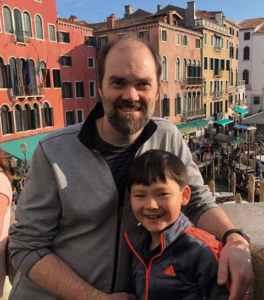Published May 26, 2020
Owen Woodward, Ph.D., University of Maryland
How did you first get involved in PKD research?

Owen: As with most things in life, it was a combination of chance and great role models. I was a Fellow with Bill Guggino at the Johns Hopkins University School of Medicine and among the many projects in the lab was a PKD-related one. I wasn’t initially working on this project, but he invited me to join the larger multi-lab PKD weekly meeting, which included the groups of Terry Watnick and Greg Germino. These discussions were exciting and both Terry and Greg offered perspectives new to me. In little time, I convinced Bill to let me work on the PKD-related projects.
The influence of these three (Bill, Terry, and Greg) ignited my interest in PKD, and it remains strong today as I see the progress the field is making in helping people with PKD.
What are you working on currently?
Owen: My lab is working on growing our understanding of how kidney cysts start to grow. We know which proteins are the “keystone” proteins in the initiation of the cysts, these are the PKD coded proteins Polycystin1 and 2, but we do not know how their defect or loss changes the morphology of the cells of the tubules within the kidney.
So how do we do this? We grow kidney tubules in gel so they can form their normal 3D shape. Then because of their special engineering, we can cut out the PKD DNA just by adding a chemical and watching the tubes turn into cysts. We can stop this process at different time points to ask, “What has changed?” Which proteins have become more abundant, which are less, which genes are turned on, which are turned off? By knowing the very first things that start the cyst growing, maybe we can target this process and stop new cysts from forming. Fewer cysts mean lower disease burden.
What would you like the patient community to know about your research?
Owen: We know the defective genes responsible for ADPKD, yet we still have few ways to directly combat the disease. This is the puzzle of many genetic diseases. Ultimately, we would want to rewrite the genetic code, correcting the genes directly, but we can’t do that yet. Instead, we must find ways to reduce the effects of these mutations, keeping the deleterious effects at bay. The only way to do this is to fully understand the consequences of losing the PKD genes. And it turns out the genes play a fundamental role in kidney development and function—so they do a lot! But every day we come closer and closer to finding targets for stopping the disease without making things even worse. This is the goal of my lab and PKD researchers all over the world.
Do you have a personal connection to PKD?
Owen: I don’t. My motivation is more analytical. PKD represents an incredibly difficult and important challenge, and as a kidney research scientist, there is no effort more deserving of my focus, energy, and knowledge. This is what drives me.
What excites you most about this research?
Owen: I find all of it exciting—discovery is intoxicating—and even the smallest insight is enough to feed you through the years of toil and dead ends and failure. (Ask my grad students!) It is an exciting time to be involved in PKD research. Recent discoveries in the structure of the polycystins, advancements made in mapping gene changes, and newly approved therapies (Tolvaptan), all suggest we are on the verge of really beating PKD, finally. I hope our efforts can play a small role in making this happen.
What are some of your personal interests outside of research?
Owen: My interests outside of the lab really are just one thing, my family. And generally mirroring whatever my son (he’s eight) is into at the moment. Right now, it’s Star Wars and soccer, and I coach his soccer team. Coaching eight-year-old boys soccer is way harder than anything I do in the lab, but it is just as rewarding!
Anything else you’d like to share?
Owen: I am continuously impressed by the PKDF and its efforts to connect the people who carry the burden of the disease with those working to fight it. This means a lot to those of us without other personal connections to PKD. Our lab immensely enjoys our participation in the annual Baltimore PKD walk, and meeting and hearing the stories of families with PKD. It makes us work even harder!
Check out Dr. Woodward’s grant and others funded by PKDF here!
The PKD Foundation is the largest private funder of PKD research in the U.S. Since 1982, we’ve invested over $50 million in more than 1,300 research, clinical and scientific grants, fellowships, and scientific meetings. Each year, the Foundation identifies and supports the work of scientists and researchers from around the world who look for ways to treat and eventually cure PKD.
Our vision is to #endPKD. Donations fund necessary research that leads to more effective treatments and ultimately a cure for PKD.









0 Comments